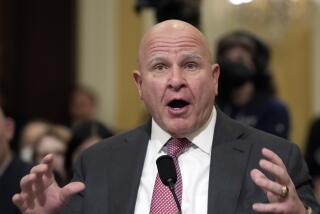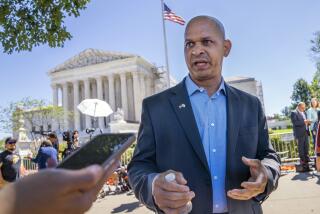Joint Chiefs denounce racism in stark terms as Trump’s isolation grows

America’s top-ranking military officers spoke out forcefully against racial bigotry and extremism, a rare public foray into domestic politics that revealed growing unease at the Pentagon with some of President Trump’s policies and views. (August 16,
Reporting from Washington — The nation’s top military officers issued public statements condemning racial bigotry and extremism, a rare foray into domestic politics that indicated deep unease Wednesday in the Pentagon with President Trump’s views on race and underscored his growing isolation.
The social media posts from the U.S. Joint Chiefs of Staff — the commanders of the Navy, Marine Corps, Army and Air Force — came amid a torrent of criticism of Trump as business executives abandoned his advisory councils, Republican elected officials distanced themselves from him and previously friendly foreign leaders criticized his comments suggesting an equivalence between neo-Nazi groups and their opponents.
In a further sign of an administration in crisis, Vice President Mike Pence announced he was cutting short a visit to South America to return to Washington a day early for meetings with Trump.
The Army doesn’t tolerate racism, extremism, or hatred in our ranks.
— Gen. Mark Milley, chief of staff of the Army
But it was the statements from the country’s top uniformed military leaders that broke most dramatically with precedent.
Each used his official Twitter account to denounce the far-right protesters behind Saturday’s deadly violence in Charlottesville, Va. — and not those who had confronted them.
They did not mention their commander in chief by name. But three of the four posts appeared after Trump sparked a bipartisan furor Tuesday by repeatedly blaming “both sides” for the clashes that followed a march by neo-Nazis, white supremacists and their allies, ending with the death of a counter-protester.
“The Army doesn’t tolerate racism, extremism, or hatred in our ranks,” Gen. Mark Milley, chief of staff of the Army, tweeted Wednesday. “It’s against our Values and everything we’ve stood for since 1775.”
Similar implied denunciations of Trump’s stand poured in from former Presidents George H.W. Bush and George W. Bush, Republican leaders in Congress, including Senate Majority Leader Mitch McConnell (R-Ky.) and House Speaker Paul D. Ryan (R-Wis.), as well as several major allies in Europe.
British Prime Minister Theresa May, one of the few European leaders who has been openly friendly with Trump, condemned the president’s comments.
“I see no equivalence between those who propound fascist views and those who oppose them, and I think it is important for all those in positions of responsibility to condemn far-right views whenever we hear them,” May said in Portsmouth, England.
The last two Republican presidents signed a joint statement Wednesday declaring that “America must always reject racial bigotry, anti-Semitism and hatred in all forms.”
Like the military chiefs, the Bushes didn’t name Trump, but their statement broke with the usual practice of former presidents refraining from even indirect criticism of the sitting chief executive.
The rebukes underscored how Trump’s response has isolated him more than perhaps any incident since the “Access Hollywood” tape was leaked a month before the 2016 election. On it, Trump was heard crudely boasting a decade ago of his ability to get away with groping women.
“There’s a truism in ... politics: Just stay away from anything remotely involving Nazis,” commented Michael Steele, who headed the Republican National Committee from 2009 to 2011, the first African American to hold the post.
Trump strained that tradition during last year’s campaign, appearing to embrace far-right groups who backed him. But as he seeks support in his latest self-created crisis, he is finding fewer safe harbors.
Business and labor leaders, whose support Trump craves most, have quit his side to protest his equating neo-Nazis to leftist activist groups, and his claim that “some very fine people” took part in the white supremacy rally.
After the chief executives of 3M and Campbell Soup bailed Wednesday from a White House advisory council on manufacturing — the seventh and eighth members to quit — Trump disbanded the group, along with a second panel devoted to general economic policy advice.
At a news conference in Chile, Pence conspicuously declined to say whether he agreed with Trump that there were good people among the white supremacists who marched.
“What happened in Charlottesville was a tragedy, and the president has been clear on this tragedy, and so have I,” Pence said.
Even before the Charlottesville violence, Trump’s support had slid in public opinion polls, and he has increased his appeals to his core supporters, holding reelection rallies far earlier in his term than his predecessors. His 2020 campaign announced Wednesday that he will address a rally in Phoenix next week, his first visit to the West since the election.
To help him weather the latest crisis, he will rely on a 28-year-old aide, Hope Hicks, whom he appointed as interim communications director on Wednesday.
Depending on how one counts, Hicks, who was one of Trump’s first hires in his presidential campaign, is the fourth or fifth communications director in the Trump White House. Hicks will replace Anthony Scaramucci, who was ousted so quickly — after 10 tumultuous days — that he was never formally sworn in.
Trump tends to ignore communications advice and Tuesday’s impromptu news conference in New York was a prime example. His comments reportedly stunned his senior staff, who only expected him to deliver a statement on infrastructure, not take questions on Charlottesville.
The Twitter posts from the military chiefs that followed suggest mounting discomfort at the Pentagon. The service chiefs support Trump’s proposals for a military build-up but have yet to implement his unexpected call on Twitter last month to block transgender troops from serving in the armed forces.
Since then, the Pentagon has stated that transgender people can serve openly until the White House issues new guidance through proper channels on how to carry out a ban, including whether to discharge transgender troops already in uniform.
Pentagon leaders were blindsided by Trump’s tweet that the military would “not allow or accept” transgender troops to serve. They also were caught off guard by his warning that he would unleash “fire and fury” if North Korea continued to threaten the United States, as well as his startling claims of a “possible military option” for the political turmoil in Venezuela.
The Twitter messages from the Pentagon chiefs had a special resonance because several of the individuals who played prominent roles in the far-right rally Saturday, or the deadly violence that followed, had served in uniform.
James Alex Fields, the alleged Nazi sympathizer accused of killing a woman and wounding more than a dozen others by ramming his car into a crowd of counter-protesters, spent four months in the Army in 2015 but failed out of basic training.
In addition, a former Marine staff sergeant who served combat tours in Iraq and Afghanistan, Dillon Ulysses Hopper, was identified as the leader of Vanguard America, a group that helped organize the “Unite the Right” rally.
According to Hopper’s service records, he was in the Marine Corps from July 2006 until January this year, serving as a recruiter for part of that time. Participation in supremacist or extremist organizations is a violation of Defense Department orders and leads to mandatory dismissal.
Marine Commandant Gen. Robert B. Neller tweeted Tuesday that there is “no place for racial hatred or extremism in the Marine Corps.”
Adm. John Richardson, the Chief of Naval Operations, started the trend on Saturday when he posted a statement on Twitter and Facebook that called the events in Charlottesville “shameful” and “unacceptable.”
“The Navy will forever stand against intolerance and hatred” he said. “We want our Navy to be the safest possible place — a team as strong and tough as we can be, saving violence only for our enemies.”
Gen. David L. Goldfein, chief of staff of the Air Force, tweeted Wednesday that he stood “together with my fellow service chiefs in saying that we’re always stronger together.”
Separately, the military moved to disavow some of the white nationalists who were photographed wearing military-affiliated clothing during the clashes.
The 82nd Airborne Division, whose paratroopers jumped into Europe to defeat the Nazis in World War II, took to Twitter on Monday to disavow a man photographed giving a Ku Klux Klan salute while wearing a hat with the division’s insignia.
“Respectfully, anyone who thinks this man represents our culture and values has never worn the maroon beret... and never will,” the 82nd Airborne tweeted.
Twitter: @wjhenn
ALSO
Read 3M CEO Inge Thulin’s statement on his resignation from Trump’s manufacturing council
Who was responsible for the violence in Charlottesville? Here’s what witnesses say
More to Read
Get the L.A. Times Politics newsletter
Deeply reported insights into legislation, politics and policy from Sacramento, Washington and beyond. In your inbox three times per week.
You may occasionally receive promotional content from the Los Angeles Times.












